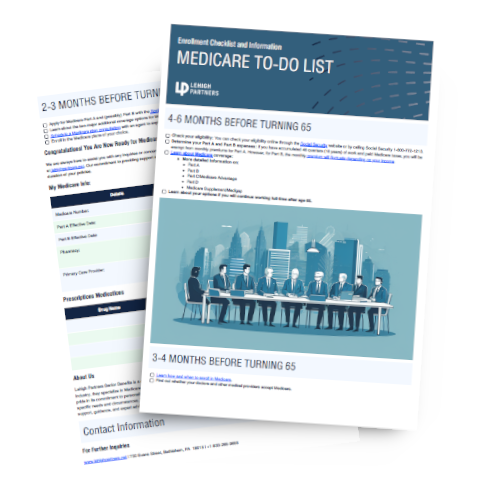Medicare eligibility begins for most people at age 65. But individuals who have been entitled to Social Security disability for at least 24 months or if someone has been diagnosed with End-Stage Renal Disease (ESRD) or Amyotrophic Lateral Sclerosis (ALS, also known as Lou Gehrig’s disease) will also qualify for Medicare benefits.
Get Free Medicare Help Today
Get a free review
Eligibility for Medicare due to a disability
You may qualify for Medicare due to a disability if you have been receiving Social Security Disability Insurance (SSDI) checks for more than 24 months, also known as the two-year waiting period. The two-year waiting period begins the first month you receive a SSDI check.
A five-month waiting period is required after a beneficiary is determined to be disabled before a beneficiary begins to collect Social Security Disability benefits.
You don’t need to sign up if you automatically get Part A and Part B. You'll get your red, white, and blue Medicare card in the mail 3 months before your 25th month of disability.
Eligibility for ESRD and ALS Medicare
People with ESRD and ALS, in contrast to persons with other causes of disability, do not have to collect benefits for 24 months in order to be eligible for Medicare. The same Medicare benefits apply for individuals with ESRD and ALS as they do for all other beneficiaries.
For ESRD patients who have a private health insurance policy in place in addition to Medicare, the private insurance (either a group or individual plan) will be the primary payer for the first 30 months, after which Medicare will become primary.
The requirements for Medicare eligibility for people with ESRD and ALS are:
- ESRD – Generally 3 months after a course of regular dialysis begins or after a kidney transplant. Patients who have been diagnosed with kidney failure can receive Medicare without 24 months of disability.
- ALS – Immediately upon collecting Social Security Disability benefits.
Application for Social Security Disability Insurance
The Social Security Administration (SSA) has an expedited procedure for processing terminal illness cases to ensure that a favorable decision can be made expeditiously. The term for this type of case is “TERI” case. A person with ALS, particularly if advanced symptoms are present, will want to advise SSA, at the time of application, that TERI case procedures are appropriate.
You can visit www.socialsecurity.gov to check the status of your application or to contact a representative about your application.
What types of Medicare coverage is available for people under 65?
If you qualify for disability and Medicare, you might have other Medicare coverage options besides or in addition to Original Medicare (Part A and Part B).
- You might be able to get your Medicare Part A and Part B benefits through a Medicare Advantage plan. Available from private, Medicare-approved insurance companies, Medicare Advantage plans deliver your Part A and Part B benefits, and usually include prescription drug coverage.
- You might be able to purchase Medicare Supplement insurance to cover what Original Medicare does not.
How much is Medicare if you are under 65?
You may qualify for premium-free Medicare Part A if you have at least 10 years of work history paying Medicare taxes. Most people pay a monthly premium for Part B, which you will have to pay even if you choose a Medicare Advantage plan. Depending on your financial situation, you may qualify for help with your Part B premiums.
Medicare Advantage plans may have an additional monthly premium, although there may be $0-premium plans available in your area. If you enroll in a stand-alone Medicare Part D prescription drug plan, and/or a Medicare Supplement insurance plan, you may pay separate monthly premiums.
There are specific times, deadlines and laws that say when and if you can apply for additional coverage. If you miss these enrollment windows you may not be guaranteed coverage.
Why not start comparing plans right away? There’s no obligation. To get started, simply click the talk to an expert button at the top of the page to request a phone call with one of our licensed agents.

